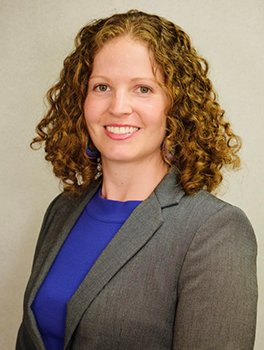Sara Feldman
“I’m exhausted; getting a PhD is challenging and requires persistence, but I have the joy of waking up every day and spending time with my mom.”

When Sara Feldman arrived at the University of Michigan in 2016, she was eager to enter fully into her graduate program and new community. After working in public health and health policy roles internationally while living and traveling with her mom—her best friend—Sara moved to Michigan on her own, while her mom moved in with a family friend back home in Colorado.
But just six months later, as Feldman walked into a final exam, her plans abruptly changed. Feldman recounts, “I got an email from our family friend that basically said, ‘I love your mom, I love you, but I can’t have her stay with me anymore. It’s too much for me, and I need her gone in a week.’ I came out of my exam thinking: now what?”
Feldman explains that she went into “crisis mode,” grappling with the sudden, dramatic shift in her relationship with her mom and trying to meet her mom’s needs without any existing local support system for herself. Feldman soon got confirmation that her mom had Alzheimer’s disease, a neurodegenerative disease that had also affected Feldman’s grandmother and great-grandmother. Following her mother’s diagnosis, Sara moved her mother across the country to live with her and her roommate in Michigan. She says that the biggest challenge was, and is, being isolated. “There’s a lot that goes on that’s unseen and unknown. Caregiving is not just about running errands, managing household tasks, and assisting with daily activities, it’s also about spending time with the person and making sure they feel like they’re part of a community when they can’t do that independently.”
Institutional barriers added to Feldman’s challenges: supports, like subsidized daycare, for students who are primary caregivers for children, spouses, and other family members are limited. While federal and state subsidies can offset some of the costs of childcare, similar supports are often not available to those like Feldman who are caregivers of spouses or other family members. Some course instructors were open to having Sara’s mother attend classes as needed depending on adult day program availability, while others quoted institutional policies and expressed that each person attending a course needs to pay tuition or that it would make the instructor or classmates uncomfortable. Feldman adds, “I always have to explain myself. I have experienced many barriers to accessing the support and resources that I need because my story of caregiving for an aging parent with a disability doesn’t fit into the criteria that’s traditionally recognized and accepted.”
As Feldman neared the completion of her master’s degree, she grappled with the decision of securing a full-time job, which would likely mean making 80k per year and devoting 50k to full-time care for her mom. The situation forced Feldman to be vulnerable and seek guidance from faculty and staff. Feldman reflects, “I’m stubbornly independent, but I knew I couldn’t do this on my own, and particularly because I was living in a state where I’m not from and where I had no established community.” For Feldman, being a caregiver has meant a constant negotiation between supporting her mom and not losing sight of her professional development. Faculty encouraged her to persist and pursue a PhD; now, Feldman is more than halfway through her doctoral studies in Health Behavior and Health Education in the University of Michigan’s School of Public Health, and in 2020, she was named a CEW+ Margaret Dow Towsley Scholar.
Feldman has remained determined despite knowing that “I can’t always align the times I provide care with the times I need to be present or on as a student.” Motivated by her family history of Alzheimer’s disease, Sara’s research is focused on Alzheimer’s disease and the impact that early identification of the disease in the brain (which is feasible through neuroimaging long before any symptoms are present) may have on people at-risk of developing the disease and family members who are likely to be future caregivers. While Feldman has been inspired by her family’s experiences with the disease, she adds, “I want my work to be focused on the broader implications of early disease identification and testing for society and public health. Alzheimer’s affects 10% of the older adult population in the US; clearly my experience is not unique.”
Above all, Feldman is honored to have the opportunity to give back to people she loves as well as help to forge a path for future caregivers. “I’m exhausted; getting a PhD is challenging and requires persistence, but I have the joy of waking up every day and spending time with my mom,” she says. “After living in Michigan now for 5 years, I get to be part of a community that is supportive and part of a growing, novel field that I think will make a big contribution.”

